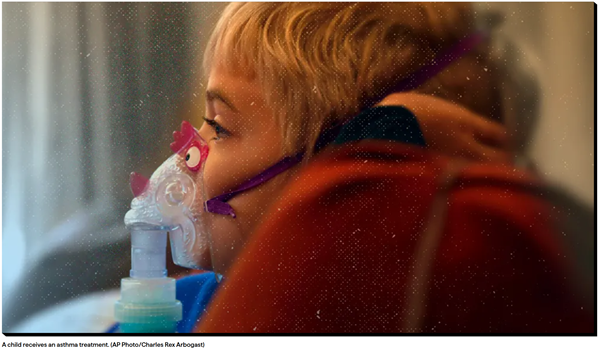For This Insurer, Breathing Now Comes With A Catch
By Helen Santoro
April 25, 2025
 Madison, a 12-year-old from Illinois, visits a medical clinic every other week to get injections of Xolair, a powerful asthma and allergy medication. The drug helps protect her from severe asthma attacks as well as serious allergic reactions to peanuts, tree nuts, and sesame seeds. Medical professionals at the clinic monitor her response to the injections, since the drug can trigger life-threatening anaphylactic shock.
Madison, a 12-year-old from Illinois, visits a medical clinic every other week to get injections of Xolair, a powerful asthma and allergy medication. The drug helps protect her from severe asthma attacks as well as serious allergic reactions to peanuts, tree nuts, and sesame seeds. Medical professionals at the clinic monitor her response to the injections, since the drug can trigger life-threatening anaphylactic shock.
But now, thanks to a policy change by her insurer, Blue Cross Blue Shield, Madison may have to self-administer the expensive injections at home.
Without access to in-clinic injections, “I don’t think I would want to do the shot at all,” Madison said. “I don’t know if I would be comfortable even doing it.”
Blue Cross Blue Shield, one of the country’s largest health insurers, just made it much more difficult for patients like Madison to get potentially lifesaving medications. The move will force many patients to self-inject at home, cutting costs for the insurance giant and, experts say, channeling more profits toward a single specialty pharmacy contracted with the insurer.
Patient advocates worry this policy change may inspire other insurers to restrict access to other vital drugs to boost revenues.
“This is a significant concern for our members… These decisions could also eventually expand beyond just these asthma injections,” said Lawren Geer, interim executive director of the Infusion Providers Alliance, a leading voice for drug infusion providers. “Ultimately, patients and their doctors should determine the most appropriate setting for administering medication rather than the insurers.”
Typically, patients with moderate to severe asthma and allergies receive injections of specialty medications at a clinic by a medical provider, who then monitors the patient for signs of anaphylaxis, a fast-acting, potentially life-threatening reaction that can involve swelling, vomiting, breathing difficulties, and shock. For patients who need this type of treatment, going without the drugs can lead to severe allergic reactions, debilitating asthma attacks, and even death.
However, Blue Cross Blue Shield implemented a new policy on April 15 across five states requiring patients and providers to go through a burdensome prior authorization process to receive these in-clinic injections — or else self-administer the injections at home. The new rule covers the insurers’ 29 million members in Texas, Oklahoma, Illinois, New Mexico, and Montana.
In a statement emailed to The Lever, a spokesperson for Blue Cross Blue Shield’s parent company, Health Care Service Corporation, said they are “committed to expanding access to quality, cost-effective physical and behavioral health care” and are “updating medical policies for some medications that are FDA-approved for self-administration.”
Increasing Barriers To Care
Many health insurers have long required prior authorizations, in which providers must obtain insurance approval for services or medications, to ostensibly guard against unnecessary procedures. However, many experts say the real reason for such requirements is to create barriers to care and reduce coverage costs.
According to the American Medical Association, which represents physicians and medical students, prior authorizations have been around for decades, but have expanded massively over the past several years and cause “unnecessary waste and avoidable patient harm.” Last January, former President Joe Biden’s administration passed a rule to better regulate the practice, though doctors argue more reforms are needed.
Thanks to Blue Cross Blue Shield’s new policy, millions of its members with moderate to severe asthma and allergies must now obtain prior approval for specialty injections, which are complex medicines that can cost more than a thousand dollars per month.
“We have like 100 prior authorizations… at any time, and that’s just with allergy drugs,” said Priya Bansal, an allergist and immunologist in St. Charles, Illinois, one of the states impacted by the policy change. “This is going to be an extra burden to our office staff, who are already burdened.”
Asthma and allergy patients whose prior authorizations are not approved by Blue Cross Blue Shield will now have to administer the injections at home. John Simley, director of communications for Blue Cross Blue Shield Illinois, said this change does not…
[READ THE COMPLETE ARTICLE HERE]
